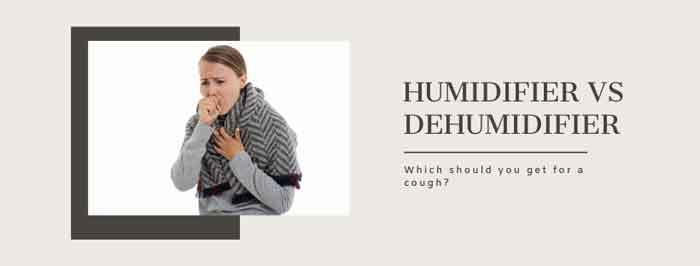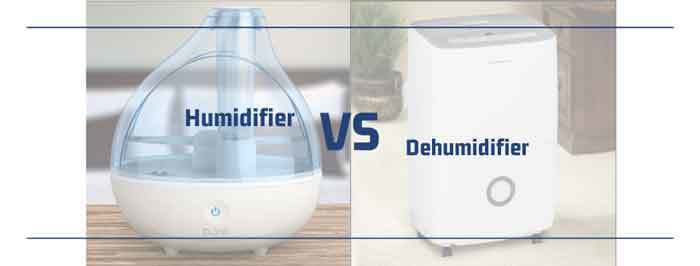Humidifier vs Dehumidifier for Cough: Which should you get?

We hear it everywhere. It echoes through apartment complexes and reverberates through households, scaring babies and sending nearby dogs into a barking frenzy.
Immediate, overwhelming, and unstoppable, coughs are often a visceral reaction to our surroundings.
Unfortunately, we usually just ignore coughs because we have very few means of stopping it; we are often helplessness when consumed by incessant coughing.
What we can do, however, is change our immediate environment to make the bouts of coughing just a bit more tolerable. As with all the most effective remedies, the secret to easing cough is daily prevention!
But which works better or cough - a lower or higher humidity?
To answer this question, we compare a humidifier vs dehumidifier for cough, to see which is best suited for our needs.
More...
What is a cough?

Coughs are strong reflexes protecting the airways from irritation. When irritants enters the airways, whether it’s dry air, or allergens such as peanut dust, or even some medication, the nerves inside the throat and lungs trigger to make us cough it out.
Coughs differ from a sneeze in that a sneeze is triggered when an irritant enters the nose.
The way a cough is triggered is through what’s called a “wandering” or vagus nerve that goes from the skull to the stomach.
The vagus nerve is so strong and spread out that it has even been found to be involved with health issues such as anxiety disorders, Alzheimer’s disease and bipolar disorder.
What triggers a cough?
A cough is triggered when particles that enter the airways rub against them in the wrong way. Dry air is especially bad for coughs because dry air makes particles more floaty.
When we cough in a dry-air environment, we produce gusts of air that kick up all the dust, pet dander, and other particles laying around, which only makes the cough worse.
Add bacteria to the mix and soon you’ve got other people coughing along with you.
In rare cases, tickling someone's inner ear triggers cough - this is known as the Arnold’s nerve ear-cough reflex.
This is especially bad during winter, when the air tends to dry out due to heating and many people share the same enclosed space.
However, every person has a different level of tolerance and their vagus nerve works in a slightly different way.
How does a humidifier work?
Humidifiers increase air humidity by spraying a fine water mist in an enclosed space. The more moisture that the air has, the more heat it can hold and the warmer it feels.
A higher humidity helps us feel more comfortable during cold weather but stops us from sweating in hot weather. We typically feel most comfortable when the humidity is between 50 and 60%.
On the other hand, low humidity increases static electricity, causes chapped lips, and sore throats. It can also make furniture and floors dry out and crack.
Humidifiers can produce warm or cool mist, with warm mist humidifiers more likely to foster bacterial growth and require more cleaning than cool mist ones.
How does a dehumidifier work?
Dehumidifiers are the “yin” to humidifier’s “yang” and work by absorbing extra moisture from the air.
Excess moisture can rot furniture, lead to condensation, warp wooden window frames, cause mold growth, and worst of all – invite creepy crawlies like centipedes and silverfish in.
Dehumidifiers simply draw in air and cool it. This makes the moisture in the air condense inside the humidifier, which then collect in a tank as water you spill out after.
But what about dehumidifiers working in cold weather? When the air is too cold, a dehumidifier with desiccants can be used. The desiccant absorbs water and has to be has to be replaced once it gets spent.
So, would a humidifier or dehumidifier be better suited for your needs?
Humidifier vs Dehumidifier for Cough

Do humidifiers help with coughs?
Most often, a cough is caused by low humidity rather than high humidity.
Hence, do humidifiers help with coughs? Yes!
In fact, a humidifier should be the first choice of action. However, there are no rules on what causes or soothes cough, so the sufferer should get to choose.
Types of cough and what helps

There are three main types of cough:
Not all coughs are the same and based on the duration and intensity of the cough, it’s possible to estimate what the cause might be.
Pay attention to when the cough appears and how long it lasts to figure out how to soothe it.
Does a dehumidifier help with cough then?
Dehumidifiers are typically not useful in soothing cough; any place that needs a dehumidifier should be vacated until humidity is in an acceptable range.
Can a dehumidifier cause a cough?

A dehumidifier can actually worsen an already existing cough!
However, unless there is already a cough, dehumidifier is unlikely to cause one by itself. It all comes down to irritation and how a person feels around a dehumidifier.
Coughing near a dehumidifier could be just a coincidence but if the dry air is an irritant for that person, the cough will lengthen and deepen.
If a dehumidifier has to run to get rid of condensation and it does turn out to be worsening a cough, it’s best to let it run when nobody’s in the room.
Conclusion: Humidifier vs Dehumidifier for Cough

In general, do humidifiers help with coughs? Yes they do!
And what of dehumidifiers? Not so much!
This is because a higher humidity can help soothe symptoms caused by irritants or inflammation, making humidifiers the recommended option for coughs over dehumidifiers.
On the other hand, dehumidifiers are typically not useful and may further irritate a person's existing cough.
Irritants are all around us. We notice them sometimes, but our body is flawless at reacting to them.
While coughs often aren't dangerous, we shouldn’t ignore cough either.
What we can do is follow a simple ground rule on soothing cough – slightly change your surroundings and track if and how the cough changes with them.
In all cases of cough, we should go with what gives us the greatest amount of comfort.
We aren’t meant to stop coughing completely but to simply keep it at a tolerable level, where we can live, work and enjoy life!
You may also like: Can Too Much Humidity Cause Cough?.


